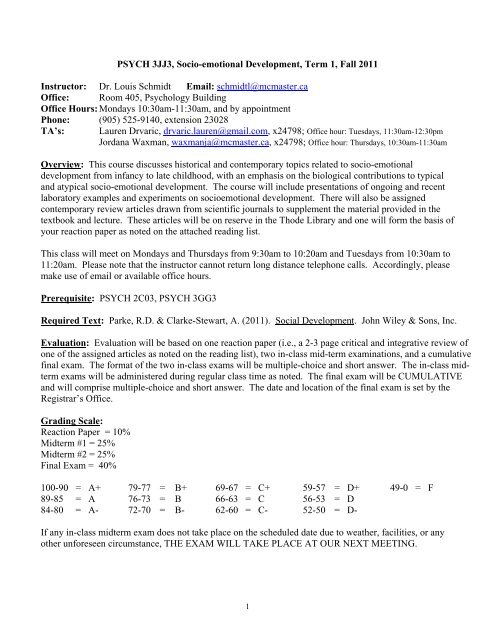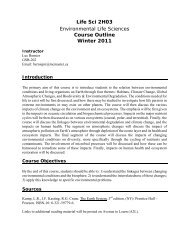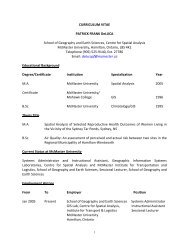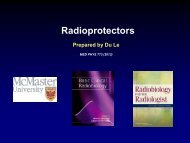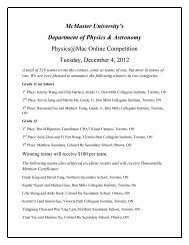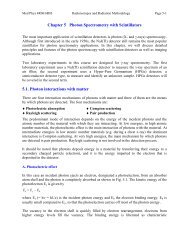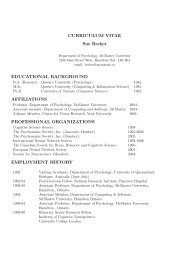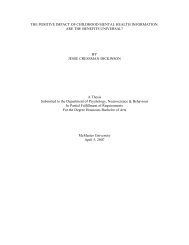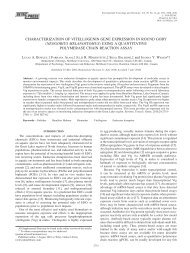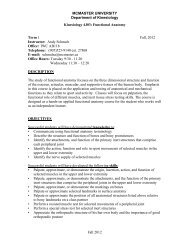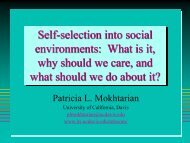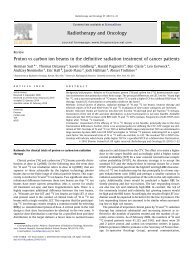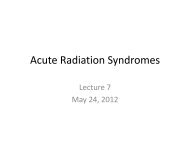PSYCH 3JJ3, Socio-emotional Development ... - Faculty of Science
PSYCH 3JJ3, Socio-emotional Development ... - Faculty of Science
PSYCH 3JJ3, Socio-emotional Development ... - Faculty of Science
You also want an ePaper? Increase the reach of your titles
YUMPU automatically turns print PDFs into web optimized ePapers that Google loves.
<strong>PSYCH</strong> <strong>3JJ3</strong>, <strong>Socio</strong>-<strong>emotional</strong> <strong>Development</strong>, Term 1, Fall 2011<br />
Instructor: Dr. Louis Schmidt Email: schmidtl@mcmaster.ca<br />
Office: Room 405, Psychology Building<br />
Office Hours: Mondays 10:30am-11:30am, and by appointment<br />
Phone: (905) 525-9140, extension 23028<br />
TA’s: Lauren Drvaric, drvaric.lauren@gmail.com, x24798; Office hour: Tuesdays, 11:30am-12:30pm<br />
Jordana Waxman, waxmanja@mcmaster.ca, x24798; Office hour: Thursdays, 10:30am-11:30am<br />
Overview: This course discusses historical and contemporary topics related to socio-<strong>emotional</strong><br />
development from infancy to late childhood, with an emphasis on the biological contributions to typical<br />
and atypical socio-<strong>emotional</strong> development. The course will include presentations <strong>of</strong> ongoing and recent<br />
laboratory examples and experiments on socio<strong>emotional</strong> development. There will also be assigned<br />
contemporary review articles drawn from scientific journals to supplement the material provided in the<br />
textbook and lecture. These articles will be on reserve in the Thode Library and one will form the basis <strong>of</strong><br />
your reaction paper as noted on the attached reading list.<br />
This class will meet on Mondays and Thursdays from 9:30am to 10:20am and Tuesdays from 10:30am to<br />
11:20am. Please note that the instructor cannot return long distance telephone calls. Accordingly, please<br />
make use <strong>of</strong> email or available <strong>of</strong>fice hours.<br />
Prerequisite: <strong>PSYCH</strong> 2C03, <strong>PSYCH</strong> 3GG3<br />
Required Text: Parke, R.D. & Clarke-Stewart, A. (2011). Social <strong>Development</strong>. John Wiley & Sons, Inc.<br />
Evaluation: Evaluation will be based on one reaction paper (i.e., a 2-3 page critical and integrative review <strong>of</strong><br />
one <strong>of</strong> the assigned articles as noted on the reading list), two in-class mid-term examinations, and a cumulative<br />
final exam. The format <strong>of</strong> the two in-class exams will be multiple-choice and short answer. The in-class midterm<br />
exams will be administered during regular class time as noted. The final exam will be CUMULATIVE<br />
and will comprise multiple-choice and short answer. The date and location <strong>of</strong> the final exam is set by the<br />
Registrar’s Office.<br />
Grading Scale:<br />
Reaction Paper = 10%<br />
Midterm #1 = 25%<br />
Midterm #2 = 25%<br />
Final Exam = 40%<br />
100-90 = A+ 79-77 = B+ 69-67 = C+ 59-57 = D+ 49-0 = F<br />
89-85 = A 76-73 = B 66-63 = C 56-53 = D<br />
84-80 = A- 72-70 = B- 62-60 = C- 52-50 = D-<br />
If any in-class midterm exam does not take place on the scheduled date due to weather, facilities, or any<br />
other unforeseen circumstance, THE EXAM WILL TAKE PLACE AT OUR NEXT MEETING.<br />
1
Please note the instructor and university reserve the right to modify elements <strong>of</strong> the course during the<br />
term. The university may change the dates and deadlines for any or all courses in extreme circumstances.<br />
If either type <strong>of</strong> modification becomes necessary, reasonable notice and communication with the students<br />
will be given with explanation and the opportunity to comment on changes. It is the responsibility <strong>of</strong> the<br />
student to check their McMaster email and course websites weekly during the term and to note any<br />
changes.<br />
Academic Integrity Policy Reminder<br />
• Please note the Statement on Academic Ethics and the Senate Resolutions on Academic<br />
Dishonesty as found in the Senate Policy Statements distributed at registration and available in the<br />
Senate Office. Any student who infringes one <strong>of</strong> these resolutions will be treated according to the<br />
published policy. Academic dishonesty consists <strong>of</strong> misrepresentation by deception or by other<br />
fraudulent means and can result in serious consequences, e.g. the grade <strong>of</strong> zero on an assignment,<br />
loss <strong>of</strong> credit with a notation on the transcript (notation reads: "Grade <strong>of</strong> F assigned for academic<br />
dishonesty"), and/or suspension or expulsion from the university. It is your responsibility to<br />
understand what constitutes academic dishonesty. For information on the various kinds <strong>of</strong><br />
academic dishonesty please refer to the Academic Integrity Policy, specifically Appendix 3, at<br />
http://www.mcmaster.ca/senate/academic/ac_integrity.htm<br />
The following illustrates only three forms <strong>of</strong> academic dishonesty:<br />
1. Plagiarism, e.g. the submission <strong>of</strong> work that is not one's own or for which other credit has been<br />
obtained.<br />
2. Improper collaboration ingroup work.<br />
3. Copying or using unauthorized aids in tests and examinations.<br />
Missed Work<br />
• If you are absent from the university for a minor medical reason, lasting fewer than 5 days, you<br />
may report your absence, once per term, without documentation, using the McMaster Student<br />
Absence Form. Absences for a longer duration or for other reasons must be reported to your<br />
<strong>Faculty</strong>/Program <strong>of</strong>fice, with documentation, and relief from term work may not necessarily be<br />
granted. When using the MSAF, report your absence by email to the instructor. You must then<br />
contact Dr. Schmidt immediately (normally within 2 working days) by email at<br />
schmidtl@mcmaster.ca to learn what relief may be granted for the work you have missed, and<br />
relevant details such as revised deadlines, or time and location <strong>of</strong> a make-up exam. Please note<br />
that the MSAF may not be used for term work worth 30% or more, nor can it be used for the final<br />
examination.<br />
2
Course Outline:<br />
<strong>PSYCH</strong> <strong>3JJ3</strong>, <strong>Socio</strong>-<strong>emotional</strong> <strong>Development</strong>, Term 1, Fall 2011<br />
Week Date Topic<br />
1 Sept 8 Introduction to Course<br />
2 Sept 12,13,15 Introduction: Theories <strong>of</strong> Social <strong>Development</strong> (Chapter 1)<br />
3 Sept 19,20,22 Biological Foundations: Genes, Temperament, and More (Chapter 3)<br />
4 Sept 26,27,29 Attachment: Learning to Love (Chapter 4)<br />
5 Oct. 3,4,6 Emotions: Thoughts about Feelings (Chapter 5)<br />
6 Oct. 10,11,13 Oct. 10, No Class: Thanksgiving Holiday<br />
Self and Other: Getting to Know Me, Getting to Know You (Chapter 6)<br />
********** OCT 13 1 ST MID-TERM EXAM (Chapters, 1,3,4,5; Paper #1) ********<br />
7 Oct. 17,18,20 Family: Early and Enduring Influences (Chapter 7)<br />
8 Oct. 24,25,27 Peers: The Wider World <strong>of</strong> Social <strong>Development</strong> (Chapter 8)<br />
9 Oct. 31, Nov 1,3 Schools and Media: Children in an Electronic Age (Chapter 9)<br />
10 Nov 7,8,10 Sex and Gender: Vive La Différence? (Chapter 10)<br />
11 Nov. 14,15,17 Morality: Knowing Right, Doing Good (Chapter 11)<br />
********** NOV 17 2 ND MID-TERM EXAM (Chapters 6,7,8,9; Paper #2) **********<br />
12 Nov. 21,22,24 Aggression: Insult and Injury (Chapter 12)<br />
13 Nov. 28, 29, Dec 1 Overarching Themes: Integrating Social <strong>Development</strong> (Chapter 14)<br />
********** DEC 1 REACTION PAPER DUE *******************************<br />
14 Dec. 5 Last Class, Wrap-up, & Review Session<br />
********** FINAL EXAM, CUMULATIVE *********************<br />
(Chapters 1,3-5, 6-9; 10-12,14; Assigned Papers 1,2,3)<br />
DATE AND TIME ANNOUNCED BY THE REGISTRAR’S OFFICE<br />
3
<strong>PSYCH</strong> <strong>3JJ3</strong>, <strong>Socio</strong>-<strong>emotional</strong> <strong>Development</strong>, Term 1, Fall 2011<br />
Papers <strong>of</strong> the Month<br />
Reading List<br />
Note: These articles will be on reserve in the Thode Library. The article for the reaction paper<br />
appears in bold type face.<br />
Required Readings:<br />
Month <strong>of</strong> September<br />
Fox, N.A., Hane, A.A., & Pine, D.S. (2007). Plasticity for affective neurocircuitry: How the<br />
environment affects gene expression. Current Directions in Psychological <strong>Science</strong>, 16, 1-5.<br />
(Article for Reaction Paper).<br />
Month <strong>of</strong> October<br />
Belsky, J., & Pluess, M. (2009). The nature (and nurture?) <strong>of</strong> plasticity in early human development.<br />
Perspectives on Psychological <strong>Science</strong>, 4, 345-351.<br />
Month <strong>of</strong> November<br />
Raine, A. (2008). From genes to brain to antisocial behavior. Current Directions in Psychological<br />
<strong>Science</strong>, 17, 323-328.<br />
4


